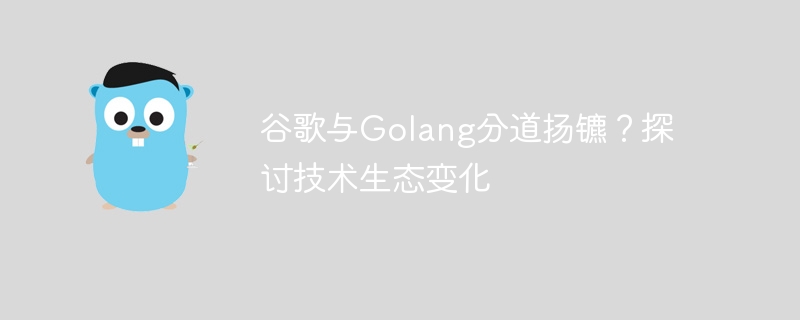

Google and Golang part ways? Discussing changes in technology ecology
In recent years, the relationship between Google and Golang has attracted much attention. As a world-renowned Internet giant, Google has always been the main supporter and contributor of Golang (Go language). However, there have been some recent signs that Google and Golang may have gone their separate ways, which has triggered discussions and concerns in the industry about changes in the technology ecosystem.
Golang is a static programming language launched by Google and has been favored by developers since its inception. Its simplicity, efficiency, ease of use and powerful concurrency performance make it widely used in cloud computing, big data, distributed systems, etc. Google's continued investment and development in Golang makes people believe that Google will continue to support the development of Golang and actively maintain the language ecology.
However, there have been some recent signs that Google may have gradually lost its passion for Golang, and the relationship between the two has undergone subtle changes. On the one hand, the number of engineers responsible for Golang in Google's core team is gradually decreasing, and they are no longer actively involved in the development and maintenance of Golang as before; on the other hand, Google has launched a series of new programming languages and technologies. These new technologies are likely to It will affect the development of Golang.
The industry has different views and interpretations of this change in the relationship between Google and Golang. Some people believe that this is Google looking for a technology stack that is more suitable for its own needs, and its gradual indifference to Golang is an inevitable choice; others believe that Google and Golang parting ways may bring some difficulties to the development of Golang, but It will also create opportunities for other competing programming languages.
In any case, the changes in the relationship between Google and Golang have triggered people’s profound thinking about changes in the technological ecology. As technology continues to develop, the technology ecosystem is also constantly changing, and any technology may face the risk of decline and replacement. Under such circumstances, how to maintain the vitality and innovation of technology and how to continue to attract developers and users have become issues that every technology company needs to seriously consider.
For Golang, it may be time to find new development directions and opportunities. As a young and dynamic programming language, Golang has unlimited potential and possibilities. As long as it continues to be innovative and open, I believe it can still play an important role in the technology ecosystem. At the same time, Google should also review its own technology strategy, find a path suitable for its own development, and continue to promote technological innovation and development.
In general, the change in the relationship between Google and Golang is a microcosm of the changes in the technological ecology. In an ever-changing technological world, no technology remains unchanged forever. The only constant is change itself. Only by constantly innovating and adapting to changes can we survive and succeed in the highly competitive technological field. I hope that after this separation, Google and Golang can each find new development opportunities and jointly contribute to technological progress and innovation.
The above is the detailed content of Google and Golang part ways? Discussing technological ecological changes. For more information, please follow other related articles on the PHP Chinese website!
 Usage of Type keyword in Go
Usage of Type keyword in Go
 How to implement linked list in go
How to implement linked list in go
 What are the Go language programming software?
What are the Go language programming software?
 How to learn go language from 0 basics
How to learn go language from 0 basics
 How to define variables in golang
How to define variables in golang
 What are the methods to implement operator overloading in Go language?
What are the methods to implement operator overloading in Go language?
 What are the operators in Go language?
What are the operators in Go language?
 What are the data conversion methods in golang?
What are the data conversion methods in golang?




